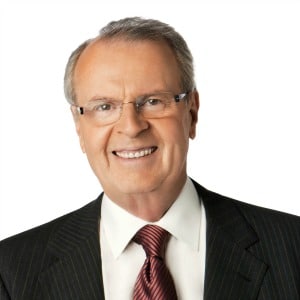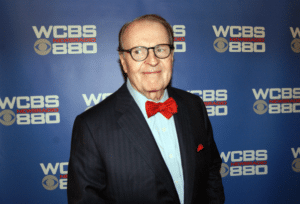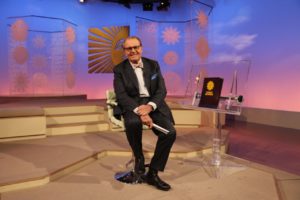
There aren’t too many broadcasters left that are as unique, creative and genuinely nice as Charles Osgood. The good news is that when Osgood retired from his position as host of CBS’s Sunday morning news program, he decided he was going to continue his broadcasts on the radio as part of the Westwood One family. We were honored to be able to speak to Osgood recently where he gave us his view on radio, calling it his “window on the world.” Today, in part two of our three-part series, Osgood talks about a few of the stories he covered early in his career and why he never went into management.
Radio Ink: You told us Monday that you started out at a music station. At what point do you transition away from music into covering news?
Osgood: I started out at WGMS, which was owned by RKO General. So I got to know the people at RKO General. I found out that they were interested in doing an experiment in paid television. I was visiting in my capacity as program director for WGMS, I just asked a lot of question about it. And I got a call from the vice president, who was in charge of this experiment and asked me if I would like to be the general manager of WHCT in Hartford, which was the first paid-television station in the United States. It was an experiment, and I would have to say it was an experiment that failed, because the market was not ready for it, and the system was very complicated. But it was good experience for me. One of the things that I learned was that I did not want to be an executive. I learned right there that I would much rather be on the air than calling the shots about hiring and firing and assigning people.
RI: Why did that push you away from management?
Osgood: What really made up my mind is when I got fired. I was very young. I was in my 20s. I don’t think it was my fault that this thing wasn’t working. A couple of managers later, they folded it. But it was interesting to see. I had to learn to make the decisions that had to be made, but I would much rather put something on that would either entertain or amuse or inform people. The next job that I looked for turned out to be at ABC.
RI: What are the main stories that you were covering back then at ABC and when you transitioned to CBS?
Osgood: There was a lot going on. The political campaign, where the country elected John Kennedy as president. Then three years after that, Kennedy’s assassination. That preoccupied the country. And by that time, partly because of the debates that preceded that election, but also because it was such a vivid story, the assassination. I was interested in television, but I had no experience in it, except for paid television, which by that time didn’t even exist. It is great having a lot of experience in something doesn’t exist. It is hard to get a job in that industry.
RI: What would you say is the biggest story that you’ve ever covered?
Osgood: It depends on what’s going on. In news, obviously there’s official news—the stuff that comes out of Washington, the stuff that the President is up to, what Congress is us to. But I’ve never been that sort of a broadcaster. Sometimes I can go for a whole day without thinking about Congress at all. Sometimes for a week or two without giving much of a damn about what bills are before Congress. Usually most of the time whether they pass or not, they don’t make that much difference in what really happens in most of our lives.
RI: What would be the kind of piece that you love to do the most on radio?
Osgood: It is a very intimate medium. Even though you may be talking to millions of people at the same time, you don’t think of it that way. They’re listening to you one at a time. Or maybe n the case of community cars, three or four at a time. They’re probably talking back at you, although you don’t know it. I always say “I will see you  on the radio.” That’s the way that I picture them, being one or at the most, a few, people. And there also doing something else at the same time. They’re driving or reading. You have to craft your stores in such a way that you capture people’s attention. If you don’t capture and hold that, they’re going get to work and just turn the radio off when they turn the car off and you’re gone for the rest of the day. I think what people want to hear is stories that they can relate to, that mean something to them that isn’t necessarily important because of the political impact that it will have. I think one of the most simultaneously shocking and boring things that I have ever heard are the debates between the two presidential candidates that we’ve had.
on the radio.” That’s the way that I picture them, being one or at the most, a few, people. And there also doing something else at the same time. They’re driving or reading. You have to craft your stores in such a way that you capture people’s attention. If you don’t capture and hold that, they’re going get to work and just turn the radio off when they turn the car off and you’re gone for the rest of the day. I think what people want to hear is stories that they can relate to, that mean something to them that isn’t necessarily important because of the political impact that it will have. I think one of the most simultaneously shocking and boring things that I have ever heard are the debates between the two presidential candidates that we’ve had.
Before joining CBS News in September 1971, Charles Osgood was an anchor/reporter for WCBS News Radio 88 in New York. Prior to that, he worked for ABC News, was the general manager of WHCT-TV Hartford, CT, and the program director and manager of WGMS-FM Radio Washington, D.C. Part hree of our interview with Charles Osgood will be in your Tuesday morning headlines.





